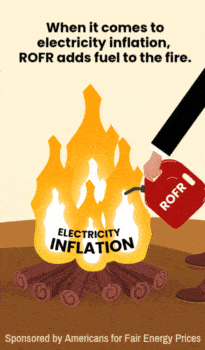* The Illinois Environmental Council on the congressional budget reconciliation bill…
The budget reconciliation bill, which narrowly advanced early Thursday morning in a 215-214 vote, includes sweeping rollbacks to the clean energy tax credits established under the Inflation Reduction Act (IRA) and signals an extreme reversal of the federal government’s commitment to climate action and environmental justice. Among the most concerning provisions of the bill are drastic cuts and limitations to clean energy tax credits:
• Due to the repeal of these tax credits, residential energy bills in Illinois are projected to increase $168 annually, and commercial and industrial energy bills are predicted to increase 21%.
• Illinois is projected to lose over $16.8 billion worth of investments from public and private sources due to the repeal of the clean energy investments, putting 105 facilities at risk of closure across the state.
• Repealing the clean energy tax credits will increase air pollution in Illinois by 3 million metric tons of carbon dioxide by 2030 and 6 million metric tons by 2035.
• Illinois stands to lose almost 30,000 jobs due to the repeal of the clean energy tax incentives and federal programs by 2030.
* Meanwhile, on a different but still related topic, this is from the Citizens Utility Board…
Ameren Illinois’ summer price for electricity will soar by an estimated 50 percent on June 1, the Citizens Utility Board (CUB) warned in a consumer alert Thursday, as the watchdog urged the utility to work with customers struggling to pay their bills so they can keep their power on during hot weather.
At a news conference, CUB explained the causes of the price spike – including the regional power grid operator’s new methodology for pricing reserve power that unacceptably raised consumer costs. CUB has launched CUBHelpCenter.com, which has tips on how to get through an expensive summer.
While cautioning that pricing has not been finalized, CUB said Ameren has reported that its electricity supply rate, also known as the “price to compare,” is set to increase by about 50 percent, to about 12 cents per kilowatt-hour (kWh) on June 1. This higher rate, which includes the supply price, a transmission charge and a “supply cost adjustment,” will increase summer power bills (June through September) by 18 percent to 22 percent, Ameren has estimated. In October, the price is expected to decrease–to roughly 8 cents to 9 cents per kWh, Ameren said.
“We urge Ameren Illinois to work with customers to keep their power on this summer, so they can stay safe and cool,” CUB Executive Director Sarah Moskowitz said. “High bills can be stressful, so we ask people across central and southern Illinois to check on neighbors, friends and family this summer to make sure nobody is taking risks by keeping their homes too hot. Long-term, this price spike just shows we’ve got to keep working for consumer protections for electric customers.”
Moskowitz called for passage of the Clean and Reliable Grid Affordability Act (SB2473/HB3779) in Springfield. The bill would implement a number of pro-consumer clean energy policies, including expanding energy efficiency and other programs that help reduce demand. She also said there is a continuing need for reform at the Midcontinent Independent System Operator (MISO), the regional grid operator for all or parts of 15 states from the upper Midwest through Ameren Illinois’ territory in central and southern Illinois and down to Louisiana.
CUB provided information about the price spike as well as consumer tips:
What’s the cause? The price for reserve power—called “capacity”—skyrocketed in a MISO-run auction that has a major impact on what consumers pay for electricity. In addition to years-long delays in connecting power plants that could help lower prices–which is also a problem with PJM Interconnection, northern Illinois’ grid operator–perhaps the biggest factor in the price spike was that MISO introduced a new pricing methodology that CUB said unfairly compromised affordability in the latest capacity auction.
What part of the bill is impacted? Supply, which is the cost of the actual electricity, and transmission. This makes up about a half to two-thirds of bills. Ameren does not profit off this price spike–under law the utility is required to pass supply costs onto customers with no markup. (Ameren profits off rate hikes on the delivery side of bills.)
If Ameren doesn’t profit off this spike, who does? Big energy companies that sell electricity to utilities.
…Adding… CUB…
Since distributing its news release (pasted below and attached) this morning, the Citizens Utility Board (CUB) has received additional information from Ameren Illinois on how much the price spike could cost customers this summer.
As reported in the release this morning, Ameren has estimated that a typical residential customer (10,000 kilowatt-hours of electricity a year) could see an 18-22% increase in their summer bills. Now Ameren has confirmed that this 18-22% increase would lead to customers paying an average of about $37.62 to $45.98 per month more during this four-month summer season (June through September).















- Lansing Larry - Thursday, May 22, 25 @ 1:37 pm:
You won’t hear me defending the utilities, but I also think one must ask the question who stands to benefit/profit from the so called Clean and Reliable Grid Act? It seems like battery storage, solar and other clean energy companies stand to continue to benefit greatly from the proposals being discussed in the GA (paid mainly through state money and increases to customer bills).
That is not to say those companies shouldn’t make money for their products/services, but its just disingenuous to act like only utilities or evil energy companies stand to make lots of money based on what energy legislation is passed in Springfield.
- Rich Miller - Thursday, May 22, 25 @ 1:40 pm:
=== battery storage, solar and other clean energy companies stand to continue to benefit greatly===
You apparently didn’t read the first item.
- Samantha - Thursday, May 22, 25 @ 1:48 pm:
Eliminate coal fired energy plants and energy supplies are reduced and prices go up. Not a shocker to anyone who took Econ 101.
- Rich Miller - Thursday, May 22, 25 @ 2:00 pm:
===Eliminate coal fired===
They weren’t competitive. The government didn’t close them.
===anyone who took Econ 101===
The worst scourge on America.
- TheInvisibleMan - Thursday, May 22, 25 @ 2:35 pm:
Is part of the reason for the overall spike a result of the reduced supply or now higher priced reserve-power that now has a higher tariff rate? Canada sells electricity into MISO, and if that is now getting a tariff slapped on it, then that’s going to increase prices for all other reserve-power auction blocks tariff or not. It will skew the entire auction market.
I’m sure it’s a small fraction of the total, probably even low single digit percentage. But it’s not nothing.
- TheInvisibleMan - Thursday, May 22, 25 @ 2:44 pm:
“Eliminate coal fired energy plants and energy supplies are reduced and prices go up.”
Coal fired plants are often rated as unreliable for capacity generation, and are not included in the capacity auction prices. I believe in the last year alone PJM has determined 20-some GW of coal power generation to be deemed unreliable. That means existing coal plants don’t count in the reserve power auctions, much less any of the ones which were closed.
Reserve power is what is going to add to the cost, as those other plants, like natgas fire up on daily cycles to meet the extra demand from air conditioners. Coal plants were never involved in capacity auctions because they can’t physically cycle that quickly.
When you get done with first-year college courses, I suggest some industry experience either on the financial or management side. College just opens the door for you to understand and quickly learn the real-life things you will need when actually doing the job.
Come back when MISO hires you for your econ101 experience.